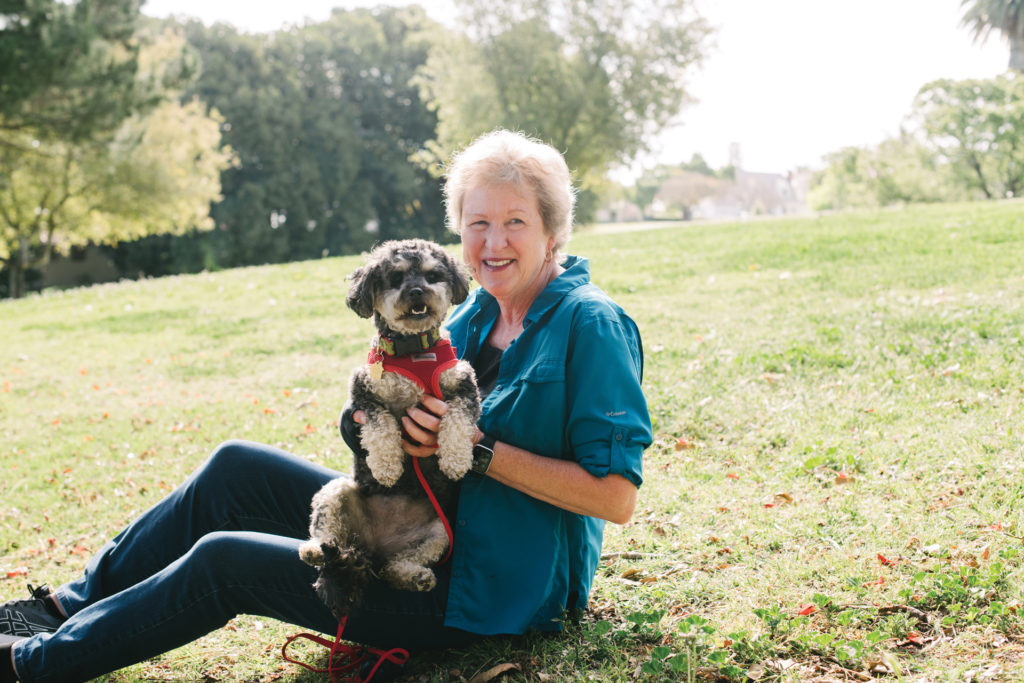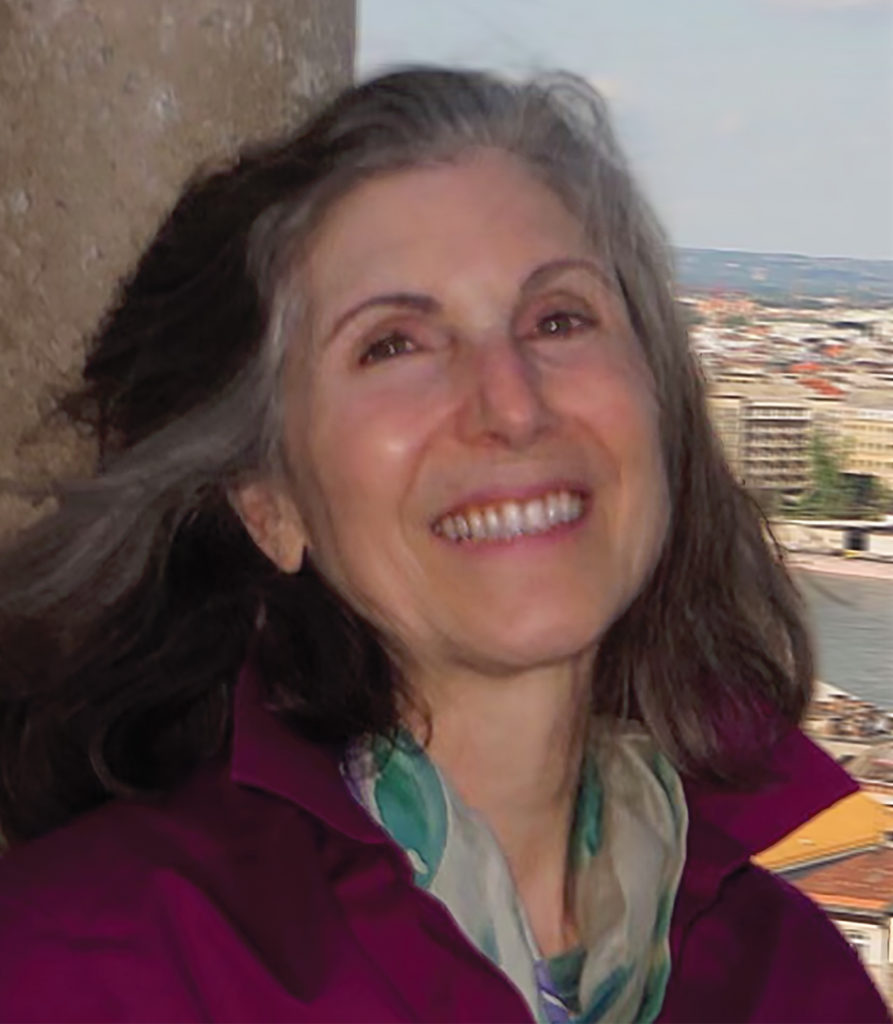Continuum of Care
During her life, cancer survivor Jean L. Gilbert gave to others. Now her legacy gift will provide cancer supportive care services for years to come.

BY SHARI ROAN / PHOTOGRAPHED BY LAUREN PRESSEY
After struggling with a rare neurological condition for several months, Kathryn Black was devastated to learn she had a dangerous form of breast cancer in 2018. Treating the condition, triple-negative breast cancer, required a mastectomy, chemotherapy, radiation and a subsequent surgery for lymphedema, a painful postsurgical condition causing swelling. By 2019, the retired attorney, age 73, was depressed, withdrawn and anxious about a cancer recurrence. However, she eventually found her footing when a nurse at Saint John’s Cancer Institute saw Black’s suffering and steered her toward the cancer supportive care services program at Saint John’s. “The cancer was pretty depressing. Triplenegative is a challenge because it has a higher recurrence rate,” says Black. “I was just having a hard time. A Saint John’s nurse, Rebecca Crane- Okada, PhD, RN, was so helpful getting me into the cancer supportive care services program. I had no idea this was available.” Today, every cancer patient coming through the Saint John’s Cancer Institute is evaluated to identify supportive care needs. The program endeavors to address the repercussions resulting from a cancer diagnosis and treatment— including management of treatment side effects, psychological and emotional health issues, changes in family dynamics, logistical and financial problems. “These are the things that can be impacted by the treatment and the cancer itself,” says Shanthi Gowrinathan, MD, a psychiatrist and director of psycho-oncology and cancer support services at Saint John’s. “Addressing these issues proactively leads to better outcomes and better quality of life.” The supportive care program at Saint John’s is now undergoing a significant expansion thanks to a donation from the Jean L. Gilbert Trust. The gift will allow supportive care team members to further address patient financial needs.
TREATING THE WHOLE PATIENT
The supportive care team includes experts in psychiatry, social work, preventive care, survivorship, palliative care and nutrition. Patients can receive help for such problems as insomnia due to cancer treatment, loss of appetite or changes to their GI tract because of chemotherapy and radiation, or assistance addressing family relationships destabilized by a cancer diagnosis. Every cancer patient is assessed on a regular basis to identify supportive care issues, Dr. Gowrinathan says. “Getting diagnosed with cancer can remove you from your life without your permission,” she says. “Supportive care deals with anything that is affecting the patient’s quality of life. Often, for example, patients assume the side effects they’re experiencing are part of cancer treatment, and they feel they have to just put up with it. But there’s a tremendous amount of knowledge about how to ameliorate side effects. “Our goal is to get people to feel like themselves during and after treatment—having moments of joy and interacting with their families and doing the things they still love.” Black credits several supportive care services with returning her to a comfortable life embellished by the joy of having a new dog—a rescue poodle-Pekingese mix named Olive. She received psychotherapy and pharmacological interventions from Dr. Gowrinathan to quell depression and anxiety caused by her cancer treatment. Black, who had lost a significant amount of weight while ill, also received nutrition counseling. She received support for the effects of the lymphedema, including therapies to reduce the pain and advice on garments she could comfortably wear. “People have no idea what having cancer is like,” Black says. “They think you have breast cancer and get surgery, chemo and that’s it. And it’s not. I liked Dr. Gowrinathan because she has direct experience with cancer patients. She focuses on the things that would be beneficial for cancer patients like me.”
JEAN GILBERT’S LEGACY
The cancer supportive services program can also help patients with personal finances impacted by cancer treatment or diagnosis—what has become known in recent years as financial toxicity related to cancer. “Our social workers go out of their way to help people figure out what insurance will pay for or where to find resources. But until the Jean Gilbert gift, we’ve been unable to deal with financial concerns that have come up,” says Dr. Gowrinathan. “That’s why we’re so over-the-moon about the gift. Because it’s these little things that make a patient feel that someone cares, and that may make all the difference.” The gift is designed to replace the work of the Santa Monica woman who inspired it. Jean Gilbert spent many years before her passing last year caring for others with cancer. “What we’re doing here is part of a natural continuation of how she was able to help and serve people,” says Paula Majeski, a longtime friend of Gilbert’s and a trustee. “She ministered to people making sure they could focus on their healing instead of worrying about how they were going to manage their day-to-day expenses.” “This trust is like an extension of what she was doing before,” says Holly Engelman, also a longtime friend of Gilbert’s and co-trustee. “It can be applied to more people as they are going through cancer—supporting people when they are outside the doctor’s office with rent, transportation and other needs.” Gilbert was a quiet and unassuming woman, according to her friends. Although, they say, she had a laugh that would turn heads. While dedicated to helping others, she avoided calling any attention to herself. “She was very observant and very empathetic,” Majeski says. “When she would see people were having trouble with medical needs, she would quietly step in and pay for things without people knowing who it was from.”
“The funds will be directed to what Jean wanted, and what she wanted was to ease people’s way.”

Gilbert devoted herself to the study of psychology, spirituality and personal growth. She used her cancer diagnosis to learn more about herself and how to heal and grow through the experience. She worked as the director of a personal growth seminar company for a time in Australia, and after returning to the United States, she dedicated herself to quietly serving others in her church and in volunteer work. She was first diagnosed with breast cancer in middle age and underwent a double mastectomy. The disease recurred and she lived with it for almost 25 years, finally succumbing to cancer on February 27, 2020, at age 70. Throughout her cancer journey, she educated herself about wellness and coping, and turned her attention to other cancer patients, Majeski says. “She tried everything and researched everything. She was always around people with similar diagnoses to share what she learned and learn from them.” Gilbert wanted her legacy of healing, loving and caring for others to continue through the gift she left for cancer supportive care services program, and she enlisted Engelman and Majeski as trustees to manage the gift. “We were with Jean through her journey of cancer. She went just about everywhere—Cedars, USC, UCLA,” Majeski says. “But she preferred the experience at Saint John’s. She felt supported and cared for here. “She would always comment that if you were going to be in the hospital, Saint John’s was the place to be. It was peaceful, spiritual and the staff was always kind and compassionate.”
ADDRESSING FINANCIAL TOXICITY
With the funds from the Gilbert donation, supportive care team members will be able to expand the program to provide financial assistance for special needs and vouchers for transportation and hotel rooms. Recently, Engelman says, she and Majeski were told of a cancer patient on a tight budget who was skimping on food because she wanted to pay for a cat sitter while she was undergoing cancer treatment. With funds from the cancer supportive service program, the woman was able to care for her cat and pay for groceries. Majeski, Engelman and Dr. Gowrinathan hope the gift inspires other donations that will create a legacy program. “The funds will be directed to what Jean wanted, and what she wanted was to ease people’s way,” Dr. Gowrinathan says. “We hope that her legacy will live on past this initial gift.” Saint John’s has a history of treating the whole patient and never turning a blind eye toward those in need—elements that were important to Gilbert in selecting Saint John’s for the gift. “There is a whole support structure they are putting in place at Saint John’s that supports her vision,” Majeski says. “They are really charging themselves with making sure they are caring for people on all levels.” Gilbert would be happy to see how the gift will be utilized but wouldn’t want thanks, she notes. “Jean mentioned, prior to her death, ‘I feel like I haven’t left a legacy,’ and this gift will carry her legacy of loving and caring to those in need,” Engelman explains. “How wonderful we can support her vision and legacy of helping people anonymously and quietly and with no strings attached through this gift.”
